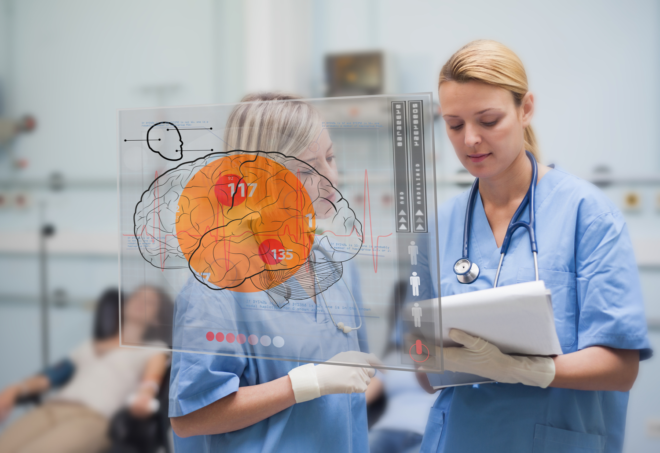The brain’s primary function is cognition. Why don’t we have measures of cognitive health as a fundamental metric of a healthy brain?
Like the heart’s primary function is to pump blood, the primary functions of the brain is to enable cognition. Cognition is defined as
“the action or process of acquiring knowledge and understanding through thought, experience, and the senses”.
While we have a host of metrics for heart function to see how well it is performing its job, we have no such metrics for the brain’s capability for cognition. Analyzing the heart beat from the ECG, for instance, is an easier job – a healthy heart has a characteristic wave that occurs at regular intervals. Irregularities in the wave or its frequency can help to identify potential heart conditions such as atrial fibrillations and blocks within the heart. The equivalent electrical dynamics of the brain measured by the EEG are more complex and characterized by irregularity and high variability.
Today our assessments of cognitive health arise from outcome measures such as tests administered within the education system. However, these tests generally measure what has been learned and may not reflect the organ’s capability for cognition.
Unpacking the elements of cognition
To get to a battery of metrics for cognitive health, we have to first unpack the elements of cognition. Cognitive scientists, educators and neuroscientists have generally defined these differently and there is no standard (see related post Linking Cognitive Science with Neuroscience. However, here is what I think would be a good list:
- Short Term Memory – the amount of stimulus that can be kept in mind on the order of seconds. This helps us react to things quickly and the more we can hold in mind, the better we can be at it.
- Long Term Memory – how easily we commit something to memory and our ability to retrieve it after a long period of time.
- Attention/ Focus – the ability and duration with which we can keep the mind focused on an object or set of objects. The flip side is distractibility. What is the level of stimulus required to push you out of your state of focus.
- Alertness – the ability to be aware of changes in the environment in real time. It is a cognitive skill different and in opposition to attention and focus.
- Symbolic association – the ability and speed with which we are able to form associations between symbols and concepts or objects.
- Flexibility – the ability to unlearn a symbolic association and learn a new one. (see related post For Cognitive Flexibility, Forget the Past)
- Latching – the ability to explore multiple solutions and arrive at a preferred one.
- Abstraction – the ability to deconstruct and associate various complex mental objects to create new ones (a second order cognitive ability that depends on symbolic associations).
These are of course largely age dependent so assessments would have to be age appropriate and also designed for a broad range of stimulus modalities. Furthermore, as a person gets older it will eventually come to reflect the extent of our education and knowledge in some way since our capabilities are not independent of our stimulus history, education being a big one. Nonetheless, these factors can be assessed outside of the context of the specific knowledge we have been exposed to.
Identifying dynamical metrics of cognition
The EEG has the potential to provide metrics of cognition. Various metrics show hints of relationship though systematic assessment has not yet been done. For example, the hurst exponent is a measure of the memory within a time series and may reflect memory function. The alpha oscillation (distinct from the overall alpha component of the power spectrum) has already been shown to have relationship to focus and attention and the measures of network connectivity could well reflect to the ability to form symbolic associations. However, there are likely more composite combinations of dynamical signatures that will ultimately prove to be better readouts. There is a wide universe to explore. Identifying brain based metrics could bypass the need for long batteries of cognitive tests and the need for cultural appropriateness. Furthermore, with increasingly cost effective EEG equipment, it will eventually be possible to quickly and cost effectively run these kinds of assessments.
Why it’s important to do this
Cognitive health is an even greater issue in the world relative to mental health and perhaps even a precursor to mental health issues. It determines the ability of the human being to navigate and adapt to a changing world and contribute productively. It is central to the future of jobs and the economy. And it is central ultimately to issues of social inequality, particularly in developing countries where impoverished stimulus and nutrient environments compromise cognitive health at an early age (see more about our cognitive health collaboration in India here). With simple methods of monitoring and evaluation that can be combined with understanding of driving environmental factors, one can imagine much better management of cognitive health at both an individual and societal level.

